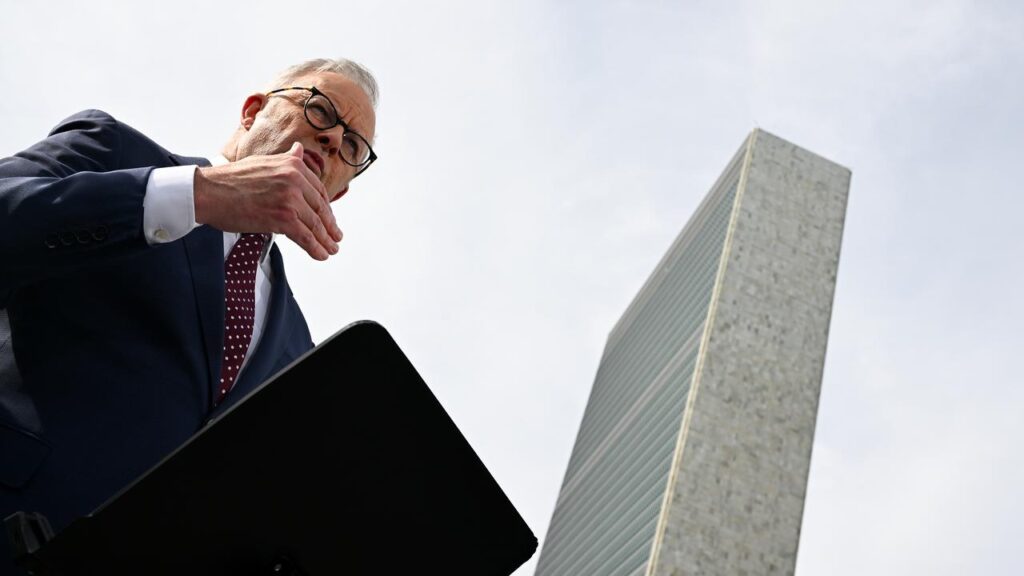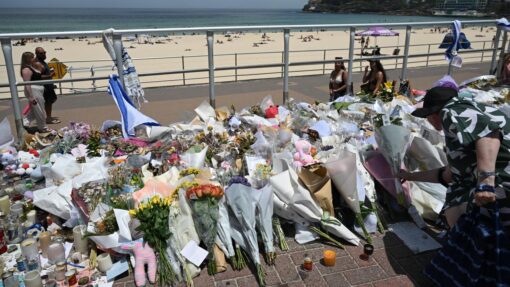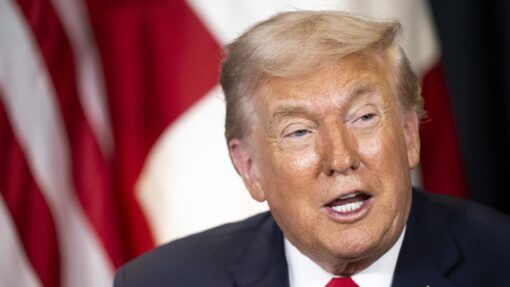Handshakes, trade and Palestine as PM takes world stage
Zac de Silva and Tess Ikonomou |

Australia has used a United Nations meeting to try to revive a long-stalled major trade deal, after formally recognising Palestine as a state.
Anthony Albanese met with French President Emmanuel Macron on the sidelines of the UN General Assembly for a 40-minute sit-down in New York on Tuesday, Australian time.
In an address to the summit of world leaders, the prime minister reiterated Australia’s support for an end to the war between Israel and Hamas, and a two-state solution.

Mr Albanese compared the plight of Palestinians to that of the Jews before the creation of Israel.
“In recognising Palestine, Australia recognises the legitimate and long-held aspirations of the Palestinian people,” he said.
“It means real hope for a place they can call home.
“This is the same hope that sustained generations of Jewish people.”

Mr Albanese and Mr Macron also discussed progress on the previously stalled free trade agreement negotiations with the EU, and Australia’s bid to jointly co-host the COP31 climate conference with Pacific countries.
The pair also talked about their nations’ co-operation on issues including support for Ukraine, the renewable energy transition and the Indo-Pacific.
The prime minister met with other leaders including his Canadian counterpart Mark Carney, UN Secretary General Antonio Guterres and European Council President Antonio Costa.
During the two-state solution conference at the UN, Mr Albanese urged the Israeli government to “accept its share of responsibility” for the humanitarian catastrophe in Gaza.
France was among a swathe of other countries that used the UN General Assembly session to recognise Palestine including the UK, Canada, Portugal, Malta and Andorra.
More than 150 UN states, or more than three-quarters of the global body’s membership now recognise Palestinian statehood.
But Australia faces pushback from 25 US Republicans who suggest “punitive measures” could be imposed on countries that have moved forward with recognition.
The grouping of Israel supporters, including former presidential candidate Ted Cruz, said countries choosing to recognise Palestine were “rewarding terrorism”.

In a briefing, White House press secretary Karoline Leavitt said Donald Trump disagreed with the decision taken by Australia and allies to recognise Palestine.
Opposition Leader Sussan Ley wrote to the American politicians, saying the decision to acknowledge Palestine “does not reflect the view of a majority of Australians”.
She pointed to an August Resolve poll showing 44 per cent of voters believed the government should not recognise statehood, 32 per cent thought the government should wait until Hamas was removed from power and 24 per cent backed Labor’s move.
“I write to reassure you, and the Congress, that this decision taken at this time by the Labor government does not enjoy bipartisan support here in Australia,” Ms Ley said.
“The federal opposition opposes this decision and would reverse it should we form government.”
The opposition leader, who flagged plans to visit the US in early December, posted on social media that she had expressed her concerns in a conversation with Israel’s foreign minister.
Mr Albanese is still working to secure an elusive formal meeting with the US president after the prime minister was left off a list of upcoming engagements released by the White House.
The two leaders are expected to speak, at least briefly, during a reception on Wednesday.
AAP


